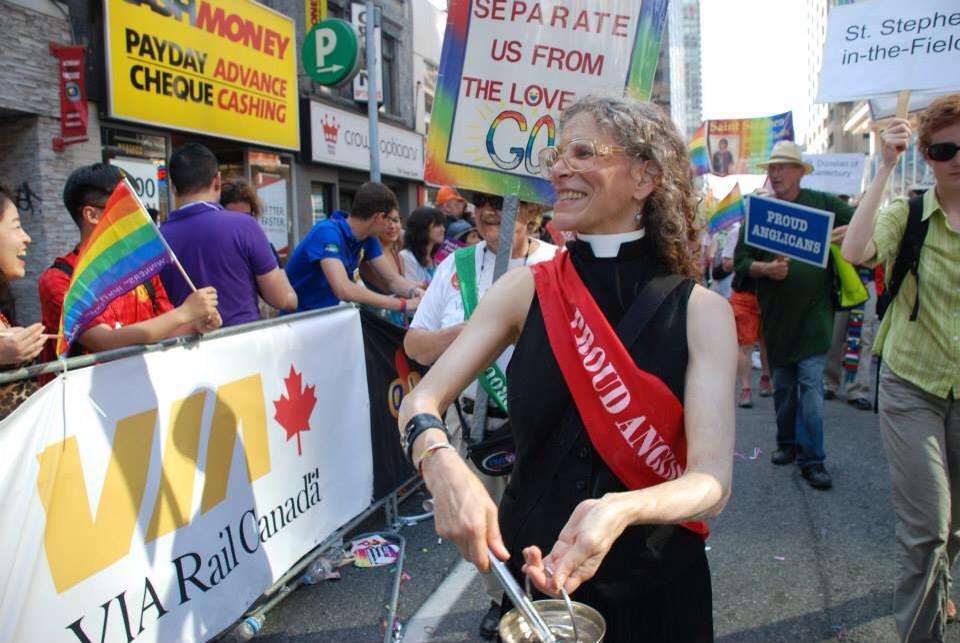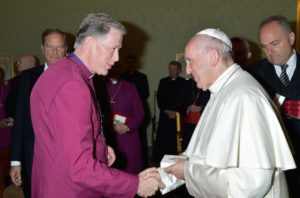The Anglican Church of Canada has produced a report on The Theology of Money in which it denounces capitalism, a system that, apparently, is mired in “structural sin”. In its place, the report seems to be proposing Marxism branded with the stamp of an ecclesiastical imprimatur.
This would all be a little less risible if the senior ACoC clergy eager to impose economic strictures on the rest of us, earned less than six figures annually themselves. But, then, as a group of literary pigs have noted: all animals are equal, but some animals are more equal than others.
I remember a number of years ago attending a meeting where Fred Hiltz, speaking in his usual soporific monotone, became almost animated when announcing some wonderful news: not that revival had overcome every obstacle carefully placed in its path and visited the ACoC, but that a major donation was on the horizon, a bequest from a dead – even more dead than usual – Anglican, as I recall.
Of course, Western civilization is obsessed with money and its acquisition but it’s not the system that’s at fault, it’s the people living in the system: us. That includes (I do like to be inclusive) clergy and a church that is forever begging for financial support.
Here, the church version of the Occupy (anything but the cathedral or the bishop’s house) Movement is explained by Rev. Maggie Helwig, a regular at the Toronto gay pride parade:
 On October 18, an Anglican Church of Canada task force has released “On The Theology of Money,” a report calling the faithful to embrace a “vision of ‘enough’” when it comes to material wealth.
On October 18, an Anglican Church of Canada task force has released “On The Theology of Money,” a report calling the faithful to embrace a “vision of ‘enough’” when it comes to material wealth.
Many Christians in the 21st century are torn between their faith, which teaches that hoarding wealth is wrong and that Christians should support each other, and an economic system that values individualism, limitless growth, and commodification, says the Rev. Maggie Helwig, a priest in the diocese of Toronto and member of the task force.
Using Biblical texts, early church teachings, contemporary theology and political theory, Helwig’s essay, Non nobis, Domine (Not to us, Lord) provides the main substance of the report, a result of two years of research, reflection and study.
Helwig makes the case that the current economic system and the value it places on money are antithetical to authentic Christianity, and should be seen as a kind of “structural sin.”
The essay takes its title from Psalm 115, which attacks the idolatrous worship of images made of silver and gold, “the work of human hands,” and argues that the money economy, as it is currently practiced today, is a similar form of idolatry.
Citing stories like God’s feeding of the children of Israel with manna in Exodus 16, to the early church practice of holding goods in common described in Acts 2, Helwig points out that the Bible consistently teaches that Christians are called to be satisfied with what they need, and to share with those who have less—an argument she believes is backed up by the Bible’s frequent denunciations of lending money on interest.
She notes, however, “This vision of ‘enough’ is not only very different from the ever-spiralling growth of the money economy, it is actually hostile to it. If we are satisfied with simple, basic human lives of good work and mutual care, we will ‘fail’ according to the terms of our economy.”
Furthermore, Helwig argues that, because the capitalist economic system sees no intrinsic value in human life, it is completely indifferent to the suffering of those who find themselves unable to succeed on its terms.
“The inability of the market alone to ensure adequate human lives for the majority of the population is increasingly clear, as the gap between rich and poor, both globally and within nations, increases,” she says, quoting a report from Oxfam, an international confederation of groups working to fight poverty, that shows inequality as having grown dramatically over the past 30 years.
“These statistics speak of human lives stripped down to the voracious needs of an economic system’s implacable internal logic,” she adds.
[……]
Helwig also believes Christians should have a voice in the political arena, pushing for more redistributive economic policies and resisting trade agreements that “have been proven to limit the ability of persons and societies to make choices for the local common good.”
Like this:
Like Loading...




 On October 18, an Anglican Church of Canada task force has released “On The Theology of Money,” a report calling the faithful to embrace a “vision of ‘enough’” when it comes to material wealth.
On October 18, an Anglican Church of Canada task force has released “On The Theology of Money,” a report calling the faithful to embrace a “vision of ‘enough’” when it comes to material wealth. But there is a growing desire in both churches to see unity as more than an end in itself, said Archbishop Fred Hiltz, primate of the Anglican Church of Canada, reflecting on his recent trip to Rome.
But there is a growing desire in both churches to see unity as more than an end in itself, said Archbishop Fred Hiltz, primate of the Anglican Church of Canada, reflecting on his recent trip to Rome.